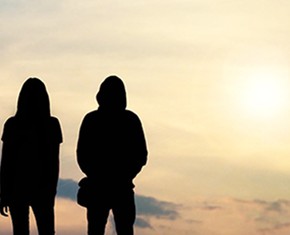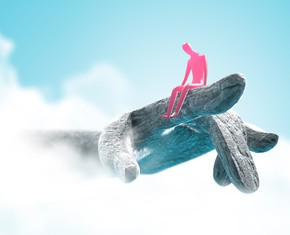The views expressed in our content reflect individual perspectives and do not represent the authoritative views of the Baha'i Faith.
We often find ourselves on edge when things feel out of our control, when we feel trapped or overwhelmed with uncertainty. The COVID-19 pandemic has people in tough positions, and in the current global climate, we are all subject to a certain level of uncertainty and lack of control.
Some of us worry about how we will afford our expenses, some of us don’t know when we will see family members again, and others are concerned for our health. As we brace ourselves for this journey of collective healing and change, patience will be key. I have been reflecting on different forms of patience that I will need to effectively navigate the situation.
1. Patience With Others
Those of us who are social distancing with a roommate, family member, a friend or a partner, are likely going to experience moments when the other person gets to us. We aren’t in a position where we can easily step away — so rather than just accepting the feelings of frustration, we can try to battle any impulse to lash out and adjust our mentality to alleviate the impatience we are experiencing.
The Baha’i writings suggest that it is easier for us to effectively love one another when we overlook their shortcomings: “One must see in every human being only that which is worthy of praise. When this is done, one can be a friend to the whole human race. If, however, we look at people from the standpoint of their faults, then being a friend to them is a formidable task.”

The other day I caught myself mentally complaining about a friend who is very stressed and making decisions that I don’t think are wise. But instead of letting myself sit in that thought too long, I reminded myself of how kind and loving she is. I took a minute to relive a memory of a time where I was distraught and how important she was in calming my nerves. This made her current decisions seem like nothing, and I resituated myself in the love that I have for her.
Baha’u’llah, the prophet and founder of the Baha’i Faith, said: “Lay not on any soul a load which ye would not wish to be laid upon you, and desire not for any one the things ye would not desire for yourselves.” We hope that people won’t look at our weaknesses. In fact, we hope they will be patient and love us even when we are not our best selves. We can practice patience much more easily if we really cling to the Golden Rule — the common spiritual message to “treat others the way you would like to be treated.”
2. Patience With Ourselves
In the process of trying to practice patience with others, we also have to practice patience with ourselves. Whether it be that we are grieving, working on internal changes we’ve wanted to make long ago, or trying to improve our habits, many of us struggle to extend patience to ourselves consistently.
A friend recently taught me a trick he’s been using that helps him shift the way he treats himself. He verbally states some of the thoughts he’s been having. In other words, he has been talking to himself more. By doing this, he pays closer attention to the way he communicates with himself and catches himself more easily when he says things that aren’t productive, kind, or truthful. Through doing this, he notices when his mind is consumed with anxiety rather than productive thoughts that help him be his best self.
Bolstering up the level of attention we pay to our internal voice improves the patience we have with ourselves, because we are aware of what we are processing. This, in turn, makes it easier to extend patience to others rather than falling victim to the urge to lash out under stress.
3. Patience With Information
This next form of patience is less related to interpersonal challenges that might arise during this pandemic, and more related to the pace and reliability of the information we access.
If you have been on the internet lately, there’s a high chance that you’ve sifted through article after article or meme after meme about COVID-19. Some people feel exhausted by the glut of information, some become overwhelmed and confused in all the noise, and others have checked out completely to avoid dealing with it. Whether you are tired of the constant talk or yearning for more, one thing is clear: We all feel a strong sense of uncertainty.
As we collectively navigate a new situation, we don’t have the perfect answers or solutions we would like. We want answers and protocols put in place, but they aren’t yet set up. A host of socio-political reasons exist for the lack of readiness and the slow flow of information to the public in the United States, but these reasons don’t change the fact that we have to figure out how to deal with the pace and the constant changes in information we receive.
Even as scientists and public health explain the causes, symptoms, and effects of COVID-19, it has become increasingly clear that information shifts as the virus itself moves through different parts of the world. If nothing else, humanity is being humbled by our inability to quickly and easily defeat COVID-19. Even as science progresses, there will always be more to learn and more effective creations to make. To have patience with the unknown is undoubtedly necessary during the coronavirus pandemic.
In addition to addressing the immediate needs and lessons that this pandemic puts before all of us, we can also spend more time trying to grasp the deeper meaning of this experience. We can think about how to move forward as this pandemic has shed light on a number of ways racism, classism, materialism, and inequality at large afflicts our society. When we unleash our minds from the more practical implications of the pandemic, we can start to meditate on what spiritual lessons we can gain in this chaotic time. Maybe we need to learn to trust others to take care of us, or to be more generous, or to find joy even as our livelihood, health, and the wellbeing of those we love is compromised. Whatever spiritual lesson we learn will not come from a research lab or a political figure. Rather it’s a lesson we will find within ourselves.
















Comments
Sign in or create an account
Continue with Googleor